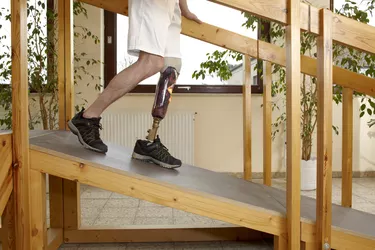
Whether from disease or trauma, losing a limb can lead to emotional and financial turmoil. Many costs are associated with amputation, including the surgery, prosthetics and medical equipment to help you get around safely. Thankfully, public and private sector financial assistance options are available that help you get through this difficult time with less debt and stress.
Medicare
Video of the Day
Obtaining financial help from Medicare for your disability can be tough, but it will pay for most of your prosthetic costs, especially when paired with Medicaid. Unfortunately, 70 to 75 percent of applicants are denied the first time, according to the Amputee Coalition. Once obtained, though, disability benefits will be retroactive to the date your injury occurred. A coding system known as L-Codes is used to determine coverage of orthotic or prosthetic services. A list of these codes and the coverage available for Medicare recipients based on the prosthetic injury is available on the Amputee Coalition's Fact Sheet, which can be located on its website.
Video of the Day
Veterans Assistance
The Veterans Health Administration provides a wide array of prosthetics, mobility devices and adaptive driving equipment. The VHA's vocational rehabilitation program allows wounded veterans to receive healthcare benefits that can help cover the cost of prosthetics and medical equipment. For veterans who reside outside the U.S., prosthetics, equipment and supplies are only available for injuries sustained as a result of their service, with few exceptions. To receive prosthetic assistance from the VHA, your prosthetic must be prescribed by a member of the VHA's amputee clinic team or a prosthetic representative.
TRICARE
TRICARE is a Department of Defense program that provides worldwide healthcare for active and retired service members and their families. According to the TRICARE website, this program will cover prosthetic needs as a result of trauma, disease or congenital anomalies. TRICARE covers most medically necessary and proven outpatient and inpatient services, which includes maintenance and repair on prosthetic devices, U.S. Food and Drug Administration-approved surgical implants, prosthetic replacements, and even training on how to use your new prosthetic. Only FDA-approved devices will be considered for TRICARE coverage.
Private Funding
Even after insurance and disability assistance pays for part of the medical expenses, many amputees are still left with a financial burden. This is especially true if you are not in the military. In these cases, amputees might be able to obtain private contributions to assist with their amputation and mobility needs. Websites such as GoFundMe and GiveForward provide online platforms that allow those with high medical bills to reach out to family, friends and strangers online for help. Assistance can range from $5 to thousands of dollars per donation. Often, businesses will agree to hold fundraisers for local residents in need of money for expensive surgeries and medical costs. If your amputation is due to a genetic disease, the Rare Genomics Institute is a nonprofit that helps families of patients with rare genetic diseases raise money toward their medical costs.